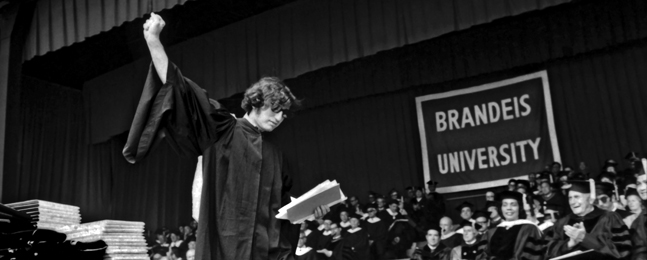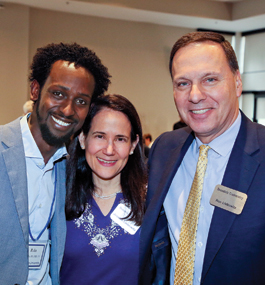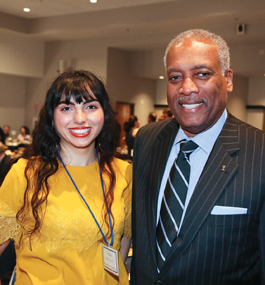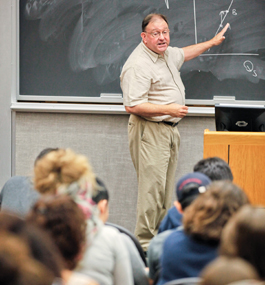Impact
The Class of 1969’s Legacy of Social Justice
When Ira Shapiro ’69 arrived at Brandeis as a first-year, the U.S. Congress had recently passed the Civil Rights Act of 1964 and the Voting Rights Act of 1965. It was a “hopeful moment of seeming peace, prosperity and expanded social justice,” he says.
But the moment soon came to a crashing halt. “In the next few years, everything changed as President Johnson escalated the Vietnam War,” Shapiro says. “We had violence in the cities. We had the assassinations of Robert Kennedy and Martin Luther King Jr. It was an incredible period of time. Most of us were moved to some form of political or social action, and Brandeis was at the ramparts.”
Brandeis students protested racial segregation; the war in Vietnam; and campus recruitment efforts by Dow Chemical, the maker of napalm. They rallied in support of the California farm workers’ union. In January 1969, students of color occupied Ford Hall for 11 days to demand better representation on campus, and white students supported their demands by occupying the lobby of the Bernstein-Marcus administrative building — protests that led to the founding of the university’s African and African American Studies department, and increased recruitment of and financial support for students of color.
“There was a lot of foment outside and here, as our consciousness was raised,” remembers Edie (Marcus) Mossberg ’69. “We had been observers, and now, all of a sudden, we were in it.”
The unrest that members of the Class of 1969 dealt with during their four years on campus helped forge deep bonds among them, so much so that, as their 50th Reunion approached, they knew they wanted their class gift to support social-justice efforts.
The 50th Reunion was co-chaired by Edie Mossberg and her husband, Walt ’69; Ira Shapiro and his wife, Nancy (Sherman) ’69; and Nina Mayer ’69. They all returned to campus for Alumni Weekend, during which Ira, a seasoned U.S. trade negotiator and ambassador, and Walt, the former personal-technology columnist at The Wall Street Journal, presented at Alumni College.
“Our Brandeis experience integrated social justice into our undergraduate education as fundamentally as thinking and writing,” Mayer says.
“A lot went on during our college years, and that’s why we feel such love for one another, for Brandeis, and for the teachers with whom we struggled to understand what was happening and what stands to take,” says Bob Shuman ’69, who served on the 50th Reunion committee with his wife, Sheila ’69.
Now the 50th Reunion committee has created the Class of 1969 Fund for Social Justice, an endowment fund to provide ongoing support for the Louis D. Brandeis Legacy Fund for Social Justice, founded by Jules Bernstein ’57 and his wife, Linda Lipsett. Once funded, the endowment would support, in perpetuity, stipends for students pursuing unpaid summer internships at social-justice organizations, scholarships to underrepresented populations, support for the social-justice festival ’deis IMPACT! and other related efforts.
“Jules has been the heart and soul of the Fund for Social Justice,” says Walt Mossberg. “He thought it up, and he has funded it. Our role is to try to make it permanent.”
Gifts to the Fund for Social Justice had topped the $100,000 endowment threshold by the time of the Class of 1969’s reunion dinner in June. Bernstein, who attended the dinner, says, “Frankly, this is wonderfully fortuitous. The class’s gift will help expand our effort to advance the principles of social justice on campus.”
Class members intend to raise $5 million for this fund and others at Brandeis. “All of us want to make the world a better place in different ways,” says Sheila Shuman. “We might look like regular suburban parents or grandparents with jobs, but our idealism and commitment to engagement is still very much alive. We are joining Jules’ investment in the values on which Brandeis was founded, and we hope others will join us with their contributions, too.”
Class members also hope the social-justice torch will be passed down to younger classes — “the next generations of people who are out there doing good,” says Nancy Shapiro. Visit giving.brandeis.edu/1969fund to learn more or make a gift.

IDEALISM: This shot of valedictorian Justin Simon ’69 (honorary degree recipient Coretta Scott King can be seen seated at right) ran as the first photo in a June 20, 1969, Life magazine article titled “The Class of ’69: With Eloquent Defiance, Top Students Protest Right Through Commencement,” about several student activists who graduated that year. Simon, who became a noted Washington, D.C., lawyer before his death in 2001, excoriated the “economic elite” in his Commencement remarks.

Zamira Korff
The Spirit of the ’60s Lives On at Brandeis
The 1960s were marked by social upheaval and challenges to the democratic ideals enshrined in our country’s history. The assassinations of John Kennedy, Robert Kennedy and Martin Luther King Jr. plunged the nation into ceaseless mourning. As the U.S. fought a seemingly endless war in Vietnam, the civil rights movement compelled us to reevaluate the concept of freedom — who has it and who is denied it — in a starker light.
Brandeis students were not immune to the period’s turbulence. They embraced a nascent activism and exercised their commitment to emet, the Hebrew word for “truth,” repeatedly bringing the university’s motto and the principles on which Brandeis was founded to the foreground.
Although it was a time of trial and deep skepticism for many Brandeisians, the 1960s also awakened a lifelong call to civic engagement. This was particularly true for members of the Class of 1969, who, like those who came before and after them, were rightly moved and empowered by the eminent values of justice, ethics and equality inherent in the Brandeis story.
As the 1969 classmates approached their 50th reunion, they began a dialogue about how they might perpetuate these guiding values for the students of today and tomorrow. The Class of 1969 Fund for Social Justice was born. In true Brandeisian fashion, the class set an ambitious goal: to raise $5 million over five years.
This fund will bolster the Louis D. Brandeis Legacy Fund for Social Justice, founded by Jules Bernstein ’57 and his wife, Linda Lipsett. The fund provides student scholarships and supports undergraduates participating in unpaid summer internships around the U.S. at premier mission-driven nonprofits. Interns gain valuable experiences — from grass-roots organizing, to building savvy marketing campaigns, to direct service — all in support of social-justice issues.
Although most of our students spend only four years on campus, their experiences here last a lifetime, inspiring them and others to dream, to dare and to effect change. I am grateful to the Class of 1969 for holding fast to our shared values, and supporting the next generation of leaders, advocates, pioneers and global citizens.
Sincerely,
Zamira Korff
Senior Vice President of Institutional Advancement
Berenson Family Gift Will Support Women in Science
A generous gift will fund a new fellowship that generally aims to expand the ranks of Brandeis women at the forefront of scientific research.
The Cynthia L. and Theodore S. Berenson Endowed Fellowship in the Sciences has been established by a $1 million gift from the Berensons, both of whom are University Fellows. Cynthia Berenson, G’13, is a Brandeis trustee and also a board member for the Women’s Studies Research Center, and the Women’s, Gender and Sexuality Studies program.
Among the Berenson family’s many philanthropic efforts in support of Brandeis are the Helaine B. Allen and Cynthia L. Berenson Distinguished Visiting Professorship in Women’s Studies, the Cynthia L. and Theodore S. Berenson Endowed Scholarship, the Cynthia L. and Theodore S. Berenson Endowed Professorship in Fine Arts, and the Allen-Berenson Research Office in the Women’s Studies Research Center. Ted Berenson’s parents, Evelyn and Theodore, began the family’s long relationship with Brandeis through their creation of the Theodore W. and Evelyn G. Berenson Professorship in Mathematics.
The Berenson Endowed Fellowship in the Sciences will encourage an increase in the number of women working to advance the disciplines of biology, biochemistry, chemistry, physics, neuroscience and computer science. The fellowship will be awarded to Brandeis graduate students who are “passionate advocates for women in science.”
The support comes on the heels of several prestigious awards for Brandeis-affiliated women scientists:
Mathematician Karen Uhlenbeck, MA’66, PhD’68, H’08, in March became the first woman to receive the Abel Prize, the world’s top prize in mathematics, recognizing the fundamental impact of her work on analysis, geometry and mathematical physics. She is a professor emerita at the University of Texas at Austin.
Susan Band Horwitz, PhD’63, won a 2019 Gairdner Award (often called “Canada’s Nobel”) for her research in developing Taxol as an anti-cancer drug. Horwitz is a Distinguished Professor in the Department of Molecular Pharmacology and holds the Rose C. Falkenstein Chair in Cancer Research at New York City’s Albert Einstein College of Medicine.
Bonnie Berger ’83, the Simons Professor of Mathematics at MIT, received the 2019 International Society for Computational Biology Senior Scientist Award. Berger, who won the Esther B. Pine Memorial Prize for academic achievement while at Brandeis, was elected to the university’s Board of Trustees in 2018.
University Professor Eve Marder ’69, the Victor and Gwendolyn Beinfield Professor of Neuroscience, received the 2019 National Academy of Sciences Award in the Neurosciences. The NAS describes her as “one of the most influential neuroscientists of her generation” and says her research has provided “transformative insights into the fundamental processes of animal and human brains.”
Assistant professor of physics Marcelle Soares-Santos this year received a Sloan Research Fellowship, one of the most competitive awards available to early-career researchers. She studies the nature of the accelerated expansion of the universe using data from some of the most powerful telescopes ever built.
Picture-Perfect
A photo gallery from events and meetings around the world.
Brandeis in China

Brandeis parent leaders Xiyuan (“Mike”) Yang, P’21, and Lin Wang, P’21 (at left), with Chaoming Deng, P’18, and Hui Li, P’18, at a Brandeis community event that welcomed President Ron Liebowitz to Beijing in April. Nearly 150 Brandeis alumni, parents and incoming students attended.
Scholarship Luncheon

Roba Bulga Jilo, MA/MBA’19, a recipient of the Elinor Gollay Scholarship, with Jessica Liebowitz and President Ron Liebowitz at the scholarship and fellowship luncheon on April 30.

Hulda Flores ’21, a recipient of the Curtis H. ’73 and Jylla Moore Tearte Endowed Scholarship, with Curtis Tearte, a member of the Board of Trustees.
Memorial Bench

Members of the Class of 1989 dedicated a bench in memory of Michael “BEMCo” Guttenberg ’89 during Alumni Weekend.
Plaque Dedication

Former fencers gathered at the Gosman Sports and Convocation Center during Alumni Weekend for a plaque dedication in honor of recently retired fencing coach Bill Shipman (standing, center), who held the job for 37 years. Alumni and friends raised more than $56,000 for improvements to the fencing facilities, which will bolster the fencing program.
Coiner Scholarship Fund

To honor Michael Coiner, an economics professor who retired in July after 20 years of teaching, current and former economics students raised more than $111,000 in gifts and pledges for the Michael Coiner Scholarship Fund. The annual scholarship will provide financial aid for an undergraduate student studying economics.
